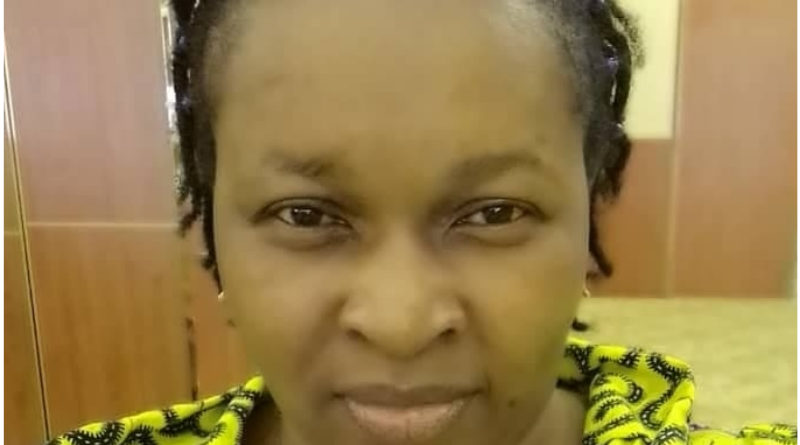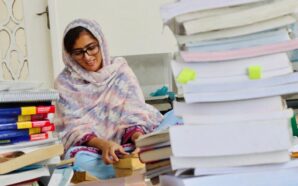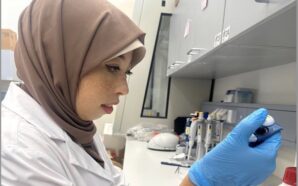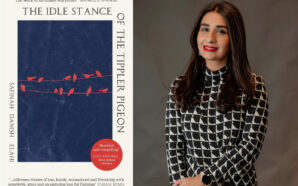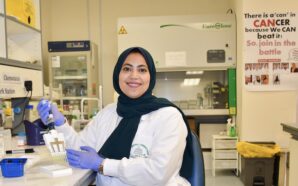Who is Veronica Ngum Ndi? Tell us a bit about yourself.
Ms. Ngum is a passionate advocate for the rights of women and girls with disabilities and those living with HIV/AIDS. She has over seven years’ experience working for their empowerment, inclusion, leadership, and decision-making at all levels of the community. Ms. Ngum’s work is focused on building resilience for women and girls with disabilities who have been affected by war in Cameroon as well as teenage mothers. For the last Five years, she has worked as a Program Officer at the Coordinating Unit of Associations of Persons with Disabilities (CUAPWD), Bamenda. Other leadership roles she holds are: President of the North West Association of Women with Disabilities (NWAWWD); and Founder and CEO of the Community Association for Vulnerable Persons (CAVP), based in Santa Subdivision. She is also a World Pulse Featured Storyteller and is doing her best to bring as many women/girls to the digital world.
Tell us a bit about your passionate advocacy for the rights of women and girls with disabilities. What informed your decision to advocate in this area?
I stand to speak for the voice of women/girls with disabilities wherever I have or find the opportunity. I was born with a disability and have faced so many challenges stemming from stigma, discrimination, marginalization, and stereotype. I have lived all my life experiencing delays in all opportunities. I face delay to attend school, get employment, and discrimination in social interaction/inclusion in community life. My decision to be passionate in advocacy was due to my experience and I wanted to support others facing similar challenges to overcome them just as I have done.
Having worked for so long with disabled people as one and having risen past it, what challenges were most prominent growing up? How did you overcome the trials and tribulations that you faced?
Stigma, discrimination, attitudinal and infrastructural barriers to inclusion and participation at all levels in the community. I developed the ability of self-empowerment and using digital tools to improve my knowledge. Other persons with disabilities are disadvantaged and limited to exposure, have low level of education, and practice self-stigma. It’s very difficult to change their perception of themselves.
In what [leadership] capacities have you been able to influence or engineer positive changes in your area of focus?
Below are the ways that I have been able to influence positive changes in my society;
- Founder of Community Association for Vulnerable Persons where young/teenage mothers and digitally empowered, education and facilitation on access to sexual reproductive health rights and service provision, and are also trained on income generation and financial independence.
- Women/girls living with HIV/AIDS and women/girls with disabilities are digitally empowered and gain skills in economic empowerment.
- President of the North West Association of Women with Disabilities where I advocate for opportunities, inclusion, and participation for them in all development activities and community life. Advocate for gender and disability friendly service provision. Empower them to speak out if faced with GBV and ensure proper case management through the referral pathway.
- World Pulse Ambassador and Featured storyteller where I have brought women with disabilities and other women to World Pulse. These women are mentored intensively. Presently, some are already attaining the stage of World Pulse Encouragers and Featured ChangeMakers
In the past few years, what has counted most for you, and what hasn’t? What are your notable achievements and why do they mean so much to you?
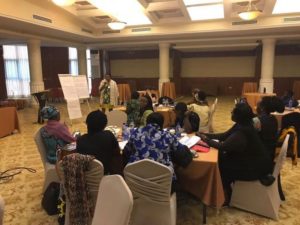
Presenting at the UN Women Consultative Meeting at Addis Ababa, Ethiopia.
What has counted most for me is the professional experience I have acquired over the past five years working with persons with disabilities and stakeholders. In addition, my ability to overcome my barriers, teach/assist others to overcome theirs too also counts. My notable achievement was when I encountered Joe Read of CARE International, who nominated me to attend the Friends of Gender, Localization consultative meeting in Addis Ababa, organized by UN Women in July 2019. It was my first experience to travel out of my country and use an airplane. This has taken me to Geneva and back and I have built good networks with other international agencies that will take my career to a greater level. It gave me the opportunity to be a member of the Friends of Gender Group and giving visibility to my work. Through World Pulse, I was also given the opportunity to attend the All African Conference of Churches in Nairobi, Kenya. It is a very good opportunity because right now, I am also a member of the All African Conference of Churches network.
What are your long-term plans for your advocacy? Are there plans in the pipeline to kick start a movement or an initiative for heightened advocacy?
Yes, the Community Association for Vulnerable Persons (CAVP) is a starting point for sustainable advocacy and empowerment to those who face GBV, stigma, and discrimination. For other women-led and women rights associations, the Cameroon Humanitarian Women Network (CAMHWONET) stands as a solid founder for empowerment and sustainability in all our works.
With regard to your advocacy work, what would be your ultimate achievement? What is the one goal that, if achieved, would rank higher than other achievements?
My ultimate achievement would be securing complete accessible vocational training and digital empowerment center to meet the education and empowerment needs of women/girls with disabilities.
What do you wish the policymakers and other key stakeholders knew about the plight of women and girls with disabilities? What would you like them to focus on addressing?
I wish that the policymakers would review their policies to give a practical representation of disability and gender
Having worked for so long with disabled people, what advice do you have for people out there struggling to cope with their disabilities? Are there any words of encouragement for them?
There are a few advice that I have for them and they include;
- Be strong, humble, and assertive.
- Love yourself and accept your status.
- Break barriers and search for opportunities because opportunities will not search for you.
- Have confidence and self-esteem and stop self-stigma.
- Speak out when faced with any form of violence.
Any extra information that you would like to share with us, with your audience and the world at large?
I would like to partner with professionals around the world for the sustainability of our work.




